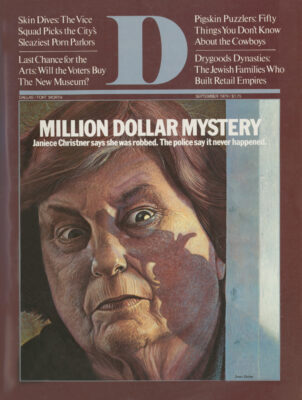That’s a nice dress you’ve got on. Who made it?” asks Carl Abady, president’of the Dallas-based apparel firm appropriately named Prophecy.
“I don’t know,” 1 reply as he ushers me into his Jackson Street office. “I got it at Loehmann’s and they cut the label out.”
Abady laughs. It’s a spontaneous, good-natured laugh. He’s in a position to understand how far a woman will go when she wants fine clothes at realistic prices. That’s his business. Prophecy has followed a quality conscious marketing plan and grown 1000 percent in five years. It’s safe to say that Carl Abady knows the business well.
“We’re drumbeaters,” he explains, as he leans back a bit behind his desk. “We happen to be living in Dallas, making great clothes.” Years ago, he recalls, the Dallas market maintained an undistinguished reputation, reinforced by its bullet-proof polyesters that appealed to chain-store customers seeking easy care. That stigma-can be as tough to iron out as an indomitable permanent press, but the people at Prophecy see themselves as supplying the steam.
Ready-to-wear sportswear in the Sixties and early Seventies catered to the post war baby-boom Junior who needed comfortable clothes. Prophecy foresaw the requirements of the same girl “grown up.” The double-ticket fit is in keeping with current slim, career-oriented looks. The fabrication is sophisticated with novelty details that are unusual for the $25 to $150 range. Add finesse and vibrant colors, and you’ve got the Prophecy concept. It’s a manufacturing firm that’s fully prepared to compete with the best and brightest New York houses.
“Dallas has natural advantages; it’s central and it’s got the airport,” Abady elaborates. “But a lot of fashion input still comes from Europe. There’s always an exodus to see what’s going on. Truth is, nothing’s going On in Europe except for the fact that French women are probably more conscious of dress. Now in New York, the perspective is different. In New York, they’re always worried about what the other guy is doing. At Prophecy, we don’t know what the other guy is doing. All we know is that there are wonderful women out there who wear our clothes. The creative atmosphere in Dallas exceeds the creative atmosphere in the Northeast. There’s no Dallas retailer who really needs to go to New York. He can get just about everything he needs right here. New Yorkers are frumpy. Who needs them?”
This kind of confidence is the accumulation of eight years of growth since Prophecy’s humble beginnings. In 1971, Abady found two partners whose combined experience covered almost everything: construction, production, and sales. Abady calls vice president Luigi Mungioli, “a master, the best technical man in town,” bred in the European tailoring tradition. Vice president Barry Miller, also reared in a manufacturing family, had gained an extensive knowledge of contract work with Miller-Cupaioli and Miller-Randazzo. This, in addition to Abady’s marketing experience with Petti, Bobbie Brooks, and Thermo-Jac, culminated in what continues to be a successful triad. They are the men behind the manpower.
Only one part of the geometric equation was left with a variable. Prophecy needed a designer and they wanted a good one. She appeared in 1974 at the age of 23. Abady, Miller, and Mungioli threw a tape measure around her neck and hired her. Polly Ellerman, who is presently the sole vice president without stock holdings, seems to be the “Prophecy Woman” incarnate although she insists she does not always design clothes she would want to wear. Gentle, petite, blessed with a voice to match her demeanor, she is the kind of woman who can walk softly into a conference room, sit down, and wield a stunning amount of influence.
“The only thing about Polly,” according to Abady, “is that the minute she finishes something, she thinks it’s not good enough. She has sensational abilities. At 28, she’s getting better every year. It’s confidence.”
Ellerman’s design career began in her hometown, St. Louis, during a seventh grade science class. Her early sketches were confiscated by the teacher who took Ellerman aside after school and encouraged her to continue drawing. She’s been a compulsive doodler ever since and the notebook beside her office telephone is crammed with figure drawings, collared necklines, and sleeve treatments. Ellerman graduated from Washington University in St. Louis, where she majored in fashion design. “Everyone in school always told me that I was talented. I made good grades but 1 really didn’t believe what they said.” Attracted by a more relaxed environment, Ellerman came to Dallas with her portfolio and looked for work. “I decided right out that I didn’t have experience, and I’d only made one promise to myself: I didn’t want to design children’s wear.” Her first break entailed pattern-making for the Lorch Company, where she claims she learned more about construction than she’d ever imagined. Then an offer came from a children’s apparel firm and Ellerman forced herself to accept the compromise. Nine months later, she opted for Prophecy.
“When 1 had my interview with Carl five years ago,” she reminisces, “his office was littered with all kinds of samples; the place was a mess. There was no receptionist. All the fabric had been purchased and they’d been operating without a designer for a full season.”
“Our clothes didn’t fit back then,” confesses Mungioli, “because there was no standard for the fit we were seeking. We started from zero, not wanting to go for the Missv or Junior. There was no track record for the woman in between, so we had to update the block (the manufacturer’s standard for fitting patterns to size) for our precision fit.”
Ellerman admits that her first season was “awful.” But the following spring line is still one of her personal favorites. “I’m not structured here,” she says. “The overall Prophecy idea is never specified. I like tasteful, sophisticated clothing designed for a purpose.”
And because Ellerman is capable of designing a variety of clothing for different moods and occasions, and because each line evolves differently from season to season, the Prophecy look is difficult to describe. Fashion language is so distorted with hackneyed, hyphenated terms too frequently placed in quotes, that the phrases “career chic,” “uncluttered classic,” and “slim silhouette,” all characterize Prophecy but fail to do justice to their marvelous clothes. The designs reflect a less sporty, more pulled-together look: soft but structured suits and skirts, camisoles and classic blouses. If fashion is truly communication by way of symbol, the woman who wears Prophecy is saying, “I’m feminine, I’m sharp, I’m serious.”
The most recent addition to the Prophecy team is designer Linn Callahan, another talented 28-year-old. Raised in New Jersey and educated in fashion design at Rhode Island School of Design, Callahan received rigorous European training while she studied for her master’s degree at the Royal College of Art in London. “European design is not very applicable to the American eye. It’s more challenging to design for the woman here. The styles are more distinctive, practical, and wearable.” Callahan left London for New York with a letter of introduction to the shoe and lingerie editor of Vogue. The woman liked Callahan’s shoe designs and helped her secure a job with Andrew Geller. A trifle discouraged with the limitations of footwear, she shifted to dress designing for Jerell and was pleased when they named an entire line “Linn Callahan” and moved her to Dallas. Once here, she found Prophecy.
“I’ve come from some screwy positions,” she says, “and at Prophecy there’s a different attitude. I get up in the morning and look forward to coming to work. The whole approach is professional, the chemistry is excellent, and we all share in the decisions. When Polly or I finish a sample, we hang it up, discuss it with Carl, Barry, and Luigi, then take it back and have the pattern cut again.”
“See the plaid skirt over there?” she asks as she gestures towards an unusual gray-green tartan. “Polly was able to design the plaid and choose the colors herself. It’s unusual to have the time to do a custom thing like that, but Carl’s in such control that we’re able to experiment with luxuries. The only pressure is the pressure we put upon ourselves. We’re realistic here.”
Ellerman has a scientific mind and Callahan describes herself as apt “to go on tangents.” Ellerman is uncommonly dainty; Callahan wears bolder jewelry and goes for lively colors. Both can wear the sample sizes of their own designs. “What we’ll have with the two designers,” Abady maintains, “is a blending of talents, a purging of ideas.” Whatever the outcome, if Prophecy lines continue to move the way they’re moving in proportion to the necessary quality-control, Dallas will be the base for an incredibly influential firm.
Retailers are particularly pleased with the sportswear coordinates and separates.
“We wish all of them did as well as Prophecy,” says Wally Moses of Jason’s, a better-priced apparel shop in Americus, Georgia. “They are our most important coordinate line. We occasionally ship some things to Rosalyn Carter. We sent some Prophecy last time and she wrote back asking for more.”
Allan Winters, president of Lester Mel-nick’s IDEAS says, “They are our single largest resource. Their delivery is good and now we have people coming in asking specifically for Prophecy.”
Vicki Toelke, a buyer for Marshall Field in Chicago, has found a home for Prophecy in the misses department. “They’re very good,” she claims. “The spring linens were right on the mark; the holiday satins were excellent.” Up until recently, Field’s considered Dallas a secondary market but Toelke now says, “It’s a market to watch.”
“They construct their things so well,” says Mary Conover at Macy’s in New York. “We’re starting an Executive Woman area and expanding Prophecy to six stores this fall. I’m excited about it.”
Mary Blake at Collections Boutique in Highland Park Village has dealt with Prophecy from its beginning. “They are a super firm for me. We’ve grown together and they’re such a personable group. For the money, they do a quality product and they’re very forward in fashion. I did a black, white, and cranberry group with them and it moved tremendously well. A New York outfit came to me later with a similar group and I had to say, ’I’m sorry, I’ve already shown it.’ We have a Prophecy following among mothers shopping for high school and college-aged daughters as well as career-girl customers.”
Prophecy is a growing leader in the garment industry but Abady insists they’re not about to aim for the larger volume sales. “We want to be the best, not the biggest. The department stores are learning from the specialty stores. The specialties cater to the customer we love. We make clothes that women are going to wear. We’re not trying to sell to everyone.”
The people at Prophecy work a hardday but Abady likes everyone to be out bysix. Ellerman stuffs a sketch book intoher canvas bag, Callahan puts her designer markers back in their proper place,Barry Miller’s wife closes the books, andeveryone meets in the hallway to wait forthe tired elevator that carries themdownstairs from the ninth floor. Once theyhit the street, it’s not unusual to run into agood-looking woman wearing somethingthey discussed over a year ago.
Related Articles

Hockey
What We Saw, What It Felt Like: Stars-Golden Knights, Game 1
Deja vu all over again.
By Sean Shapiro and David Castillo

Movies
A Rollicking DIFF Preview With James Faust
With more than 140 films to talk about, of course this podcast started with talk about cats and bad backs and Texas Tech.
By Matt Goodman

Business
New CEOs Appointed at Texas Women’s Foundation and Dallas Area Habitat for Humanity
Plus: Former OpTic Gaming CEO Adam Rymer finds new e-sports post, Lynn Pinker Hurst & Schwegmann hires former Mary Kay chief legal officer, and more.
By Celie Price and Layten Praytor


